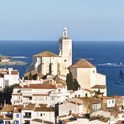When asked who should be the first president of the EU, most European leaders refuse to speculate on names, claiming that the terms of the job need to be defined before individuals can be discussed. At least that's what they say on the record. But the main French newspapers recently revealed, in strikingly similar reports, that sources at the Elysée were ruling out Tony Blair for the job as there was too much opposition to him. Even the left-wing groups in the European parliament don't want him, said the unnamed sources. Instead, Jean-Claude Juncker, veteran chain-smoking premier of Luxembourg, was the favourite.
So who was doing the briefing? These stories appeared just after the newspapers' Brussels correspondents had been invited en masse to the Elysée for an audience with none other than the president, Nicolas Sarkozy. On the surface, this is a considerable blow to Blair, because Sarkozy first put the former prime minister's name into the frame. Now even Sarko thinks Blair is a dead duck. But it may be a mistake to take this at face value. The front-runner for an EU job invariably fails to secure the position, because their enemies are given enough time to stop them. So Juncker may not relish being in pole position.
Moreover, Sarko said nothing negative about Blair as a candidate, and the Elysée may still back him if circumstances change. Gordon Brown doesn't want Blair in the job, but he can't be seen to be obstructing his predecessor. And the change of government in Italy brings the man with whom Blair used to holiday back to the front line: Silvio Berlusconi.
Blair is a divisive and controversial figure because of Iraq, but remains the only big-name candidate. He appeals to some pro-Europeans, such as Sarkozy, who want the EU to have global clout. In a year when the US may elect the charismatic Barack Obama as president, Europeans would look feeble if they choose as their figurehead Juncker, who runs a country of less than 0.5m people, equivalent to the population of Lyon.
Blair's real difficulty is in Germany, whose chancellor, Angela Merkel, is backing Juncker or the former Austrian chancellor, Wolfgang Schüssel. It's nothing personal: Merkel got on with Blair when they overlapped as premiers. But Berlin never liked the idea of a president of the European council, and agreed to it only as part of a package which includes a new voting system giving Germany more power than any other country. A stronger council weakens the commission and therefore threatens the Germans' favoured motor of European integration. Merkel would prefer to limit the terms of the presidency to something more suited to the mayor of Lyon than the former prime minister of Britain. But whatever he says to Le Figaro, Sarko is unlikely to see things that way.
The hour of the EU's "odd bods"
Voters in Ireland have not yet had their chance to give a verdict on the new treaty of Lisbon. But work is already under way on one of the treaty's provisions—the creation of a new EU diplomatic corps, called the external action service (EAS). Preparations are discreet for now, since officials cannot appear to be taking the treaty ratification process for granted. But, if all goes according to plan, the EAS should start work in 2009, under the direction of the EU's foreign policy supremo. This position is currently held by Javier Solana, but someone else may well have taken over the job by then.
The EAS will have a headquarters in Brussels. The rest of it will be formed from the existing European commission representations to other countries. The people who work in the representations, which are essentially the EU's embassies, were once described as "odd bods" by former British foreign secretary Jack Straw. "We've got a lot of these people abroad, and it is not entirely clear what they are doing," Straw told the Commons foreign affairs committee in 2004.
Although Straw later apologised privately for his comments, he did have a point. But with the creation of the EAS, commission representations will take on some diplomatic functions as well as administering EU activities and spending programmes. This is likely to include the co-ordination of foreign policy positions, something done at present by the ambassador of the nation that holds the EU's rotating presidency.
The change may not be without hiccups. Senior EU officials concede that, over time, the profile of the representatives will have to change. In the meantime, member states are offering to lend the EU some of their diplomats. "The worry," says one Eurocrat. "is that instead of offering the crème de la crème, they'll dump the ones they don't want on us."
What title befits Robert Cooper?
Another provision of the Lisbon treaty is the merging of the commission and council foreign relations teams. This is destined to create personnel problems, such as what to do with the EU's resident foreign policy thinker, Robert Cooper. He is certain to be asked to stay on, but will need a new post. Cooper will also have to relinquish his current title, which only a Eurocrat could have thought up: director general of the general secretariat.











